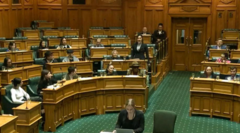The New Zealand Parliament has suspended three Māori MPs for their haka protest aimed at a controversial bill redefining the Treaty of Waitangi. The unprecedented suspensions follow growing tensions between the government and Māori communities over indigenous rights and representation.
Māori MPs Face Unprecedented Suspension for Protest Haka in Parliament

Māori MPs Face Unprecedented Suspension for Protest Haka in Parliament
Three Māori MPs in New Zealand have been suspended following their haka performance to protest a controversial bill, highlighting ongoing tensions regarding indigenous rights.
New Zealand's Parliament made headlines recently when it voted to suspend three Māori MPs over their dramatic protest haka during a legislative session last year. The MPs, part of Te Pāti Māori (Māori Party), took a stand against a contentious bill seeking to redefine the nation’s foundational Treaty of Waitangi—a move that has ignited significant backlash and national discussion.
Hana-Rawhiti Maipi-Clarke, who initiated the haka in response to questioning on her party's stance on the bill, has been handed a seven-day suspension. In contrast, her co-leaders, Rawiri Waititi and Debbie Ngarewa-Packer, received 21-day bans each. This bill, which aimed to legally clarify the principles of the Treaty of Waitangi, ultimately faced strong opposition and was voted down, illustrating the fraught nature of post-colonial relations in New Zealand.
Historically praised for its efforts to uphold indigenous rights, New Zealand's relationship with Māori communities has soured under the current conservative government, leading to increasing frustrations. The aggressive haka—an expression of strength and defiance—has garnered global attention since a video of the MPs performing it went viral last November.
The parliamentary committee's decision to suspend the MPs is unprecedented, with the previous longest suspension issued lasting just three days. Speaking during the debate over their penalties, Maipi-Clarke delivered an impassioned plea, questioning whether their voices were deemed "too loud" for the chamber. The discourse was further inflamed when Foreign Minister Winston Peters labeled the Māori Party as "a bunch of extremists" and called for an end to their influence, prompting demands for his apology.
With only six seats held by the Māori Party in the 123-member parliament, the situation underscores the ongoing struggle for Māori representation and rights. The failed Treaty Principles Bill ignited outrage, with protests drawing more than 40,000 participants outside Parliament in November, reflecting widespread discontent surrounding the government's approach to Māori issues. Critics argue that the proposed legislation would have further exacerbated divisions within the country, undermining crucial support for indigenous communities.






















